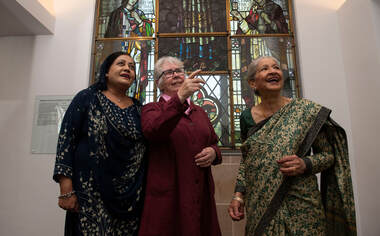
I took part in two events. One was rather unusual in that the three speakers were men. The thought behind this was an exploration of what it would mean for men to be allies in the discourse on gender equality and for women and men to be equal partners in society, so why not hear a male voice? The topic is too great for a one-off dialogue but it did raise some interesting questions e.g did any women ever found a religion? The answer of course was no, though there are examples of important and influential women who began religious movements in Hinduism and founded religious orders in Christianity and are respected within the tradition. Within these contexts women have shown themselves to be competent and inspirational leaders but not given a leadership role within the institutional hierarchy of the religion. This is very obvious to me as a Catholic for in my Church women cannot be ordained and religious services with a number of clerics on the altar during a Eucharist can seem quite oppressive and certainly exclusive. Even in religions such as the Baha’i faith where equality between men and wome is seen as indispensible for harmony in society men usually outnumber women in their governing councils and their supreme council, the Universal House of Justice has only male members. None of this is surprising because all religions have been founded and developed within patriarchal societies and are conditioned by that culture. And religions are traditionally conservative bodies so change is a slow process.
The second event I attended was an account of the work of an interfaith group on domestic violence. The purpose of this group is to raise awareness of domestic abuse, particularly within faith communities and they have developed challenging resources to help in this. Domestic abuse, sexual harassment, bullying are universal in all societies whether they be religious or not and the group wants to make faith communities aware that religious communities are not immune to it. There wasn’t a woman in the audience who hadn’t some experience of this, either in her own life or in that of a family member or friend. It’s important that faiths face up to this but also that they face up to those elements of their scriptures or traditions that can be used to legitimate violence or exclusion, without necessarily realising it. Take the christian religion as an example. Jesus attracted a lot of women to his movement and it appears from the scriptures that they were often leaders in the small christian groups that met in one another’s homes, even leading the worship. However this went against the norms of Roman or even Jewish society and before long the apostle Paul was directing women not to talk in Church or appear with their head uncovered. Societal respectability became more important than the ideals of the faith.
On the whole religion has been ambivalent about women, speaking of them in ideal terms which are often very different from their reality. Women are to be venerated but also feared as they can be a distraction and temptation to men and bring shame upon their families and communities if they became pregnant or rebelled against the tradition. Because of this they are to be kept under control, confined within the man-made boundaries which has traditionally meant confined to the home and to handing on the tradition of the faith but not participating in leadership or leading public worship. Traditionally menstruation and childbirth have been seen as rendering women unclean, impure. For example, Hindu women do not lead family prayers when menstruating and in pre-Vatican II Catholicism women had to go through a purification service called churching after childbirth.
The patriarchal society in which religions have grown up is hierarchical and reflects Aristotle’s belief that “the relation of male to female is by nature a relation of superior to inferior and ruler to ruled.” This view influenced the great Catholic theologian Thomas Aquinas who also accepted that women should be subject to men and saw man’s superiority as coming from the fact that he had been created first and directly from God while woman had been created from man and therefore not quite made in the image of God in the way that man was – a view found in the Christian scriptures such as that of Paul’s letter to the Corinthians where he says “man was not created for the sake of woman but woman created for the sake of man” or the letter to Timothy which suggests "Let the woman learn in silence with all subjection. I suffer not a woman to teach, nor to usurp authority over the man, but to be in silence”. The Qur’an also states that men are in charge of women because Allah has made one of them to excel the other, the woman’s role is to serve her husband. It even states ‘I have not left any disorder more damaging to man than woman’. And in the Buddhist tradition the Buddha is reported as saying that his Sangha would not last as long once women were admitted.
One of the difficulties within religion is that often these kinds of statements are taken at face value and given divine status and can be used to legitimise violence and dominance. Thank goodness scripture scholars and feminist theologians recognise this bias and are emphasising positive attitudes to women in the scriptures and reclaiming the stories of the strong independent women to be found in all faiths. But the reality still exists that texts and traditional attitudes can and still do give legitimation to some men to control women. This too needs to be publicised.


 RSS Feed
RSS Feed
